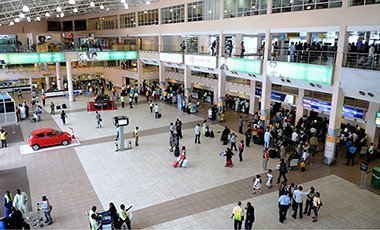In a landmark move set to redefine Nigeria’s aviation landscape, the Federal Airports Authority of Nigeria (FAAN) has launched a cashless and contactless payment system, initially implemented at the bustling Murtala Muhammed International Airport (MMIA) in Lagos and the Nnamdi Azikiwe International Airport in Abuja.
This initiative, announced at a press event in Lagos, aims to revolutionise how payments are processed within Nigerian airports and serves as a potential model for the future of airport services across Africa.
The new system, operational at all entry points including car parks, access gates, and VIP lounges, is designed to eliminate cash handling, addressing longstanding concerns about the transparency of airport revenue management. FAAN’s Managing Director, Olubunmi Kuku, highlighted the significant financial benefits expected, projecting a 50% increase in revenue during the pilot phase, with the potential to reach 75% nationwide. With full implementation, FAAN anticipates tripling its annual revenue, a testament to the transformative power of digital payment technology.
“By significantly reducing our reliance on physical cash, we are building a system that is inherently more transparent,” Kuku stated, emphasising that the system aligns with international best practices. “Every Naira due to the Authority is duly collected and accounted for.”
Historically, FAAN has faced criticism regarding revenue collection, particularly from non-aeronautical sources. In 2024, Nigerian airports collectively generated over N382 billion, with Lagos accounting for a dominant 67% and Abuja 21.3%. The introduction of automation is expected to push these figures beyond N500 billion, indicating the profound impact of technology on airport management.
At the core of this system is a contactless card, available at all access points in Lagos and Abuja, which users are encouraged to activate and fund. FAAN is committed to a phased rollout, aiming to completely phase out cash transactions by the first quarter of 2026. Brand ambassadors are stationed at access gates to assist customers, ensuring a smooth transition. This phased plan prioritises enhancing operational efficiency, reducing congestion, improving revenue collection, and aligning with global standards for seamless airport access.
Beyond financial gains, the cashless policy promises broader benefits. Passengers can expect faster transactions, while airport businesses can anticipate lower transaction costs and reliable internet connectivity. Adebola Agunbiade, FAAN’s Director of Commercial and Business Development, highlighted the policy’s potential to extend financial services to those with limited access to traditional banking, promoting greater financial inclusion.
A comprehensive awareness campaign, including stakeholder forums, billboards, and social media, is underway. Future phases will encompass casual flights, VIP lounges, and car hire operations, further embedding digital payments throughout airport operations.
Operational data underscores the initiative’s potential scale, with access gates in Lagos and Abuja handling over 300,000 vehicles per month and VIP lounges serving thousands of high-value customers annually. Enhanced convenience and transparency in these high-traffic areas are expected to deliver a measurable impact on customer satisfaction and operational efficiency.
The initiative has garnered support from aviation experts. Olumide Ohunayo, General Secretary of the Aviation Roundtable, praised the move as a step toward improved service delivery, noting that the shift to digital systems would free staff for strategic roles, increasing productivity and revenue.
However, some concerns have been raised about potential network disruptions and the integration of legacy systems. Group Captain John Ojikutu, a respected aviation analyst, stressed the need for accurate data reconciliation and seamless system integration.
Despite potential challenges, the implementation of a cashless and contactless payment system at Nigeria’s busiest airports represents a bold step toward future-proofing African airport infrastructure. This development signals a broader shift towards digital transformation, customer-centric service delivery, and global competitiveness. As the system expands, it is expected to serve as a benchmark for other countries in the region seeking to modernise their aviation sectors. The coming years are likely to see other African nations follow suit, leveraging technology to enhance airport operations and drive financial inclusion.











